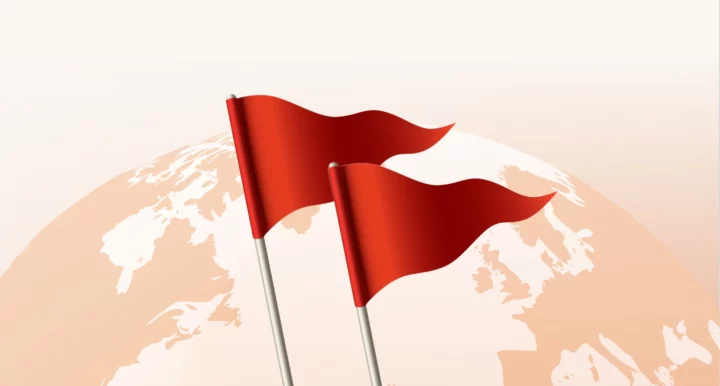China’s economic and political ambitions often prompt concerns that Western governments will impose sanctions in response to violations of international law. That possibility is particularly worrying for Western businesses because of the significant market disruption they would cause. China is a major trading partner to the West: the UK, US and EU operate at a trade deficit with China, with the UK importing £63.6 billion of Chinese goods in 2021, the US importing $450.4 billion, and the EU €472 billion. With so many Chinese-manufactured goods consumed in the West, the impact of any new sanctions is hard to predict.
Chinese diplomatic relationships also complicate the sanctions landscape. President Xi Jinping’s expression of support for the Russian invasion of Ukraine in 2022, for example, created speculation that China would follow Russia’s lead by attempting to impose its rule on neighbouring Taiwan – an outcome that would force Western governments to take action.
While many Western countries currently implement China sanctions programmes, a China-Taiwan conflict would lead to fresh rounds of penalties, and force companies around the world to adjust their sanctions screening solutions in order to comply. China’s response to new sanctions will also be significant. Xi Jinping’s government recently established its own international sanctions programme, with measures that affect a range of Western individuals.
Many firms were caught off-guard by the swift (and ongoing) implementation of sanctions against Russia. To help your firm be ready to react to any emerging risk, we’ve put together a guide to the current state of play on the China sanctions landscape.
China Sanctions: Global Overview
Western governments have imposed sanctions against China in response to a number of recent international incidents, including espionage activities and human rights violations. Key global China sanctions programmes include:
United States
Most of the US’ current sanctions against China were imposed during the Trump administration in response to Chinese espionage activities and human rights abuses. Those sanctions included a 2018 ban on US agencies using Huawei products, and targeted sanctions against Chinese officials in response to the repression of Uyghur Muslims in 2020. In that year, the US also sanctioned Hong Kong and Chinese officials for undermining democracy in Hong Kong.
In 2022, the Biden administration imposed sanctions against Chinese businesses for supplying technology to Russian military networks in the conflict against Ukraine. The ban applies to advanced computing and semiconductor technology.
United Kingdom
In 2021, the UK imposed sanctions against China for the first time in response to human rights violations against minority Uyghur Muslims. The sanctions targeted the Xinjiang Productions and Construction Corps, and 4 Chinese officials.
Canada
In coordination with other Western allies, Canada imposed sanctions on China in 2021 in response to its treatment of the Uyghurs. Canada’s China sanctions programme includes a ban on the export of sensitive technologies, and imposes investment and travel bans.
The European Union
The EU has responded to China’s crackdown on Uyghur Muslims with the imposition of new economic sanctions in 2021. The sanctions targeted four Chinese officials and introduced export bans on technologies that could be used to conduct surveillance activities on the minority group.
Recent Changes to China Sanctions
The most recent global sanctions against China have broadly focused on addressing espionage and China’s ongoing support for Vladmir Putin’s invasion of Ukraine. The measures have typically been led by the US.
- In 2023, the US issued sanctions against Spacety China for providing the Russian military with satellite surveillance imagery of Ukraine, The US also sanctioned Chinese companies for providing technology to Iranian drone manufacturers which, in turn, supplied the Russian military.
- Following incursions by Chinese spy balloons into US airspace in February 2023, the US sanctioned several Chinese aviation and technology companies. The sanctions banned the export of parts and technologies, including valuable computer chips, from the US.
- In April 2023, the US also imposed sanctions on entities within China for supplying chemicals used in the production of fentanyl by Mexican drug cartels.
- In May 2023, the EU proposed a new sanctions package against 7 Chinese entities in response to their support for the Russian invasion of Ukraine.
China’s Sanctions Programme
It’s important to remember that China has also implemented its own sanctions programme to counter Western measures. China sets out its sanctions targets in the Unreliable Entity List (UEL), which was introduced in 2019 and is administered by the Ministry of Commerce (MOFCOM).
China has designated numerous Western targets on the UEL, focusing predominantly on US, UK, EU, and Canadian politicians. Recent designations on the UEL followed Western sanctions imposed in response to the Hong Kong democratic protests and the oppression of Uyghur Muslims, but China has signalled that it may expand its measures to counter new geopolitical pressures.
In 2022, China imposed sanctions against a number of Taiwanese officials following a visit by US House Speaker Nancy Pelosi, and followed up in 2023 with a second round of sanctions, which included Taiwan’s de-facto ambassador to the US. There are also indications that China will retaliate against US tech sanctions by placing sanctions on the export of certain technical components alongside some biotechnology.
The Future of China Sanctions
Xi Jinping’s support for the war on Ukraine will continue to have a significant effect on China sanctions programmes. In addition to the EU’s proposed sanctions, it is likely that the US will broaden its ban on the export of technologies to China, with a continuing focus on the export of microchips and semiconductors. The US may also broaden the scope of sanctions to more Chinese business entities, to capital flows into China, and to other Chinese industries, including biopharmaceuticals and medical software, both of which rely heavily on US intellectual property.
While the US typically has the capacity to act unilaterally against China, it is likely that other countries, including the EU, will adjust their sanctions posture depending on the outcome of geopolitical events – including the war in Ukraine, and the Chinese government’s treatment of Taiwan.
Taiwan
China’s position on Taiwan will be a significant factor in any future Western sanctions. While Taiwan has been governed independently since 1949, China has made clear that it intends to eventually bring the island under its full administrative control. To that end, China has engaged in recent actions to emphasise that objective, including military provocations against Taiwan and its Western allies, and issuing sanctions against high profile individuals who undermine China’s claim.
Any escalation of those actions may lead to conflict between China and Taiwan, and would force Western governments to impose new sanctions. In the wake of the coordinated action against Russia, it’s likely that new sanctions against China will be severe, and have a similar impact on Western businesses, affecting much of the industrial landscape and creating a significant new compliance burden.
In the event of a China-Taiwan conflict, firms will have to keep pace with governments in order to avoid penalties. To mitigate risk, it’s a good idea to begin compliance preparations now, rather than waiting until sanctions become a reality. Practically, this means that firms should closely monitor geopolitical developments concerning China and Taiwan, and review current levels of risk exposure, including supply chain and third party risks. Similarly, firms should update their sanctions screening solution to capture emerging risk factors, with particular attention to adverse media searches and multilingual name screening capabilities.
Screening Solutions
Given the obligations that China sanctions impose, it’s vital that firms consider the specific screening challenges of hypothetical targets. While firms should screen regularly for updates to official sanctions lists, there are other specific screening challenges, including:
Multi-Lingual Screening
In order to detect China sanctions risk effectively, firms must be capable of capturing data written in Chinese characters. To that end, solutions should include multi-lingual and multi-script name matching capabilities, and account for the following factors:
- Use of non-Latinate characters, for example: 习近平 (Xi Jinping).
- Transliteration of names from native to Western characters.
- Use of Asian naming conventions, such as the reversal of first names and surnames, or approximations of anglicised spellings.
- Misidentification of similar-sounding or similar-spelled names, and variant spellings.
Accounting for multi-lingual challenges means integrating a software solution with sophisticated screening capabilities and, ideally, recruiting compliance teams with the relevant language expertise.
Adverse Media Screening
Emerging sanctions risks are often revealed by news and other media sources before they are officially implemented in government sanctions lists. Investigative journalists, for example, may expose evasion of China sanctions, along with the firms that facilitate that activity.
With that in mind, to stay ahead of the compliance curve, and anticipate emerging sanctions risk, firms should focus on screening adverse media or negative news for stories that involve their customers, with searches taking in traditional screen and print media, along with websites, social media, forums, blogs and so on. Adverse media screening should have a global scope, including searches of domestic, Chinese, and global data sources, and firms should apply the same multi-lingual approach as they apply to other screening processes.
Next Generation Screening
China sanction screening solutions should facilitate fast, efficient searches that minimise noise and false positives, and empower firms to make confident decisions. To achieve that goal, firms must integrate flexible technology that can manage the quickly evolving challenges of both the sanctions and adverse media landscapes.
Ripjar’s Labyrinth Screening platform is capable of searching thousands of global data sources, combining official sanctions list screening with multi-lingual adverse media searches. Labyrinth searches in real time, in over 20 foreign languages, in order to provide meaningful, contemporary data in seconds, and inform strong, speedy decision making. Powered by next generation machine learning technology, Labyrinth also enables firms to extract the most relevant data points, building more accurate customer risk profiles while minimising false positive alerts.
To learn more about China sanctions screening and compliance, contact us today
Last updated: 6 January 2025





